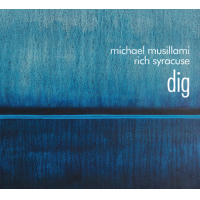Home » Jazz Articles » Album Review » Michael Musillami and Rich Syracuse: Dig
Michael Musillami and Rich Syracuse: Dig
It's noteworthy that the album leads off with a couple oftunes that are decidedly not among Evans' most storied compositions. "C Minor Blues Chase" was never recorded by Evans, and "Twelve Tone Tune" only surfaced on The Bill Evans Album (Columbia, 1971), arguably after his peak years were behind him. But they do have Evans' characteristic harmonic invention and rhythmic subtlety, both of which are captured wonderfully by Musillami and Syracuse. The two converse in avid dialogue, moving from written to improvised parts seamlessly, with enough lyricism to remind us of Evans but still maintaining their artistic independence. Musillami's gorgeous tone is so easy on the ears that it's hard not to be lulled by it, thereby overlooking the first-rate technique and virtuosity he brings to the instrument. And Syracuse's fleet scamperings are vital in the gripping exchanges making up "Twelve Tone Tune," bringing to mind Evans' original bass prodigy, Scott LaFaro, in his ability to play with such rhythmic fluidity and melodic freedom.
The more well-known tunes appear next, with "Blue in Green," "Nardis," and "All Blues" revealing the deep mutuality between Evans and Miles Davis, the latter of whom wrote all three pieces (perhaps with co-authorship in the case of "Blue in Green," at least as claimed by Evans). "Nardis" is the most striking of the three, played initially with only the most tenuous references to the tune's melody, as Musillami and Syracuse deconstruct the piece masterfully, Syracuse's arco bass interacting with Musillami's spartan lines to produce a brooding atmosphere before the duo turn the piece loose with some fierce swing as the melody fully emerges. But that's not to take anything away from the crystalline beauty of "Blue in Green" or the crunchy groove of "All Blues," both of which are delightful. One can tell that Musillami in particular really enjoyed getting to strut a bit on "All Blues," showcasing a grittier side to his playing than is otherwise found on the album.
Earl Zindars' "How My Heart Sings" is another trademark Evans cut, with the tune's memorable melody given faithful adherence here with an up-tempo rendition that gives both players ample solo space, even though at under four minutes it's the album's shortest track. And finally, with "Bill's Hit Tune" we have as a closer yet one more under-recognized Evans piece, and Syracuse's rich arco gracefully announces the emotion-laden theme as the duo conclude the album with warmth and heartfelt devotion to one of jazz's greatest artists.
Track Listing
C Minor Blues Chase; Twelve Tone Tune; Blue in Green; Nardis; All Blues; How My Heart Sings; Bill’s Hit Tune.
Personnel
Michael Musillami
guitarMichael Musillami: guitar; Rich Syracuse: bass.
Album information
Title: Dig | Year Released: 2019 | Record Label: Playscape Recordings
Comments
About Michael Musillami
Instrument: Guitar
Related Articles | Concerts | Albums | Photos | Similar ToTags
Michael Musillamiand Rich Syracuse
Album Reviews
Troy Dostert
Dig
Playscape Recordings
Michael Musillami
Rich Syracuse
Bill Evans
Wayne Shorter
Charles Mingus
Scott LaFaro
Miles Davis
For the Love of Jazz
 All About Jazz has been a pillar of jazz since 1995, championing it as an art form and, more importantly, supporting the musicians who create it. Our enduring commitment has made "AAJ" one of the most culturally important websites of its kind, read by hundreds of thousands of fans, musicians and industry figures every month.
All About Jazz has been a pillar of jazz since 1995, championing it as an art form and, more importantly, supporting the musicians who create it. Our enduring commitment has made "AAJ" one of the most culturally important websites of its kind, read by hundreds of thousands of fans, musicians and industry figures every month.




















